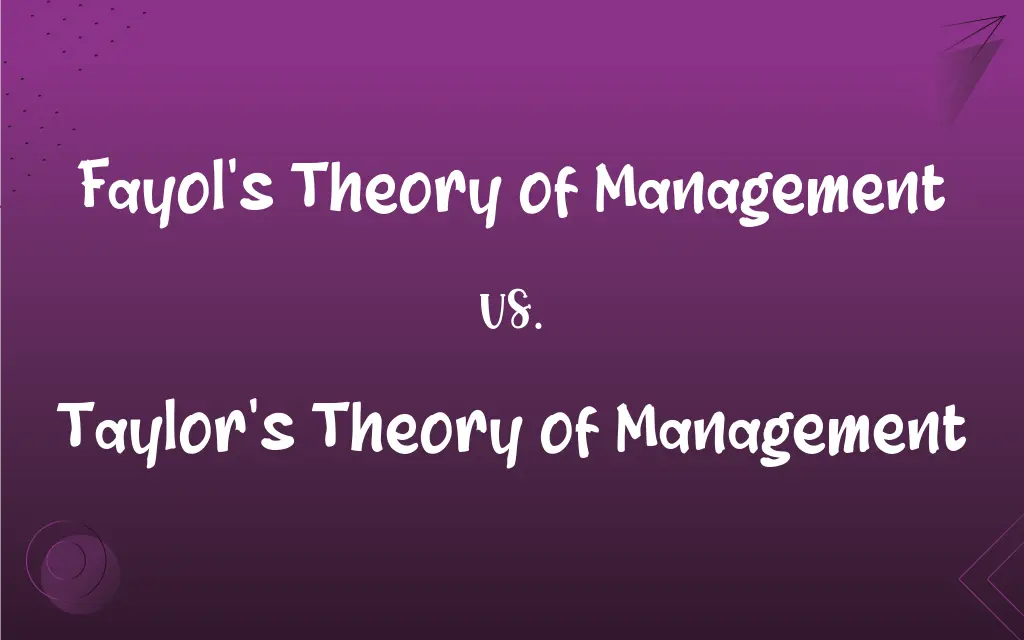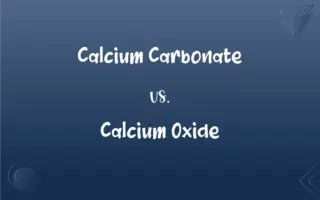Fayol’s Theory of Management vs. Taylor’s Theory of Management: What's the Difference?
Edited by Aimie Carlson || By Janet White || Published on July 25, 2024
Fayol's theory focuses on administrative and organizational principles, while Taylor's emphasizes scientific analysis for workplace efficiency.

Key Differences
Fayol's theory of management centers on general administrative principles, advocating for a top-down approach in organizational structure and decision-making. In contrast, Taylor's theory of management, known as Scientific Management, focuses on increasing efficiency through scientific analysis of work methods and worker productivity.
Henri Fayol's theory emphasizes the roles and relationships of senior management and the importance of managerial functions like planning, organizing, leading, and controlling. Frederick Taylor's approach, on the other hand, is more focused on the operational level, seeking to improve efficiency through time and motion studies and the standardization of work tasks.
Fayol's theory advocates for principles such as division of work, authority and responsibility, discipline, unity of command, and prioritization of organizational goals. Taylor's theory, conversely, is grounded in principles like task specialization, the use of scientific methods to determine the best way of doing a job, and a strong push towards task efficiency and productivity.
In Fayol's approach, management and leadership are key, with a strong emphasis on the moral and educational qualities of the manager. Taylor's theory, however, views workers and their tasks from a more mechanistic perspective, focusing on the most efficient ways to perform specific tasks, often reducing the need for skilled labor.
Fayol's theory is more holistic and considers the organization as a whole, while Taylor's theory is more reductionist, breaking down every task to its simplest components to improve efficiency and productivity.
ADVERTISEMENT
Comparison Chart
Focus
Administrative and organizational principles
Scientific analysis of work for efficiency
Approach
Top-down management and general principles
Bottom-up, task-focused, and methodical
Key Principles
Division of work, authority, discipline, unity of command
Task specialization, scientific method, efficiency in tasks
Managerial Emphasis
Leadership qualities, managerial functions
Efficiency, time and motion studies
Scope
Holistic view of organization
Focus on individual tasks and operations
ADVERTISEMENT
Fayol's Theory of Management and Taylor's Theory of Management Definitions
Fayol's Theory of Management
A management theory emphasizing administrative principles and top-down organizational structure.
Under Fayol's theory of management, the company streamlined its hierarchy to improve decision-making.
Taylor's Theory of Management
Theory aiming to enhance operational efficiency by breaking down tasks into simpler components.
The application of Taylor's theory of management streamlined the packing process for increased output.
Fayol's Theory of Management
A holistic approach to management, prioritizing organizational stability and employee satisfaction.
The company's adoption of Fayol's theory of management resulted in improved employee morale.
Taylor's Theory of Management
Approach emphasizing time and motion studies for the standardization of work tasks.
Taylor's theory of management led to a complete overhaul of the workflow, making it more systematic.
Fayol's Theory of Management
Theory emphasizing the moral and educational qualities of managers in an organization.
The new training program was designed in line with Fayol's theory of management, focusing on developing leadership skills.
Taylor's Theory of Management
Management theory focused on increasing efficiency through scientific work analysis.
The factory implemented Taylor's theory of management to optimize its assembly line.
Fayol's Theory of Management
Management theory advocating for principles like unity of command and division of work.
Applying Fayol's theory, the organization restructured to ensure clear lines of authority.
Taylor's Theory of Management
A system prioritizing task specialization and the scientific method to improve productivity.
By adopting Taylor's theory of management, the company reduced production time significantly.
Fayol's Theory of Management
Framework focusing on managerial functions such as planning, organizing, and controlling.
Implementing Fayol's theory of management, the firm enhanced its planning processes for better control.
Taylor's Theory of Management
Management style focusing on efficiency and reducing the need for skilled labor.
Implementing Taylor's theory of management, the firm automated several processes, reducing reliance on skilled workers.
FAQs
What is Fayol's theory of management?
Fayol's theory is a comprehensive approach focusing on administrative principles and organizational structure.
What does Taylor's theory of management emphasize?
Taylor's theory emphasizes scientific analysis for workplace efficiency and productivity improvement.
How does Fayol's theory approach decision-making?
Fayol's theory advocates a top-down approach in decision-making and managerial control.
How do Fayol's and Taylor's theories differ in their view of workers?
Fayol's theory sees workers as part of a larger organizational system, while Taylor's theory often views them in terms of task efficiency.
What role do managers play in Fayol's theory?
Managers play a central role in Fayol's theory, focusing on leadership and administrative functions.
What are some criticisms of Taylor's theory?
Criticisms include potential dehumanization of workers and overemphasis on task efficiency over worker well-being.
What are some criticisms of Fayol's theory?
Criticisms include its rigid hierarchical structure and potential lack of flexibility in dynamic environments.
What is a key feature of Taylor's theory of management?
A key feature is the focus on task specialization and scientific methods to determine the best way of doing a job.
Can Taylor's theory be integrated with modern management practices?
Yes, Taylor's principles can be integrated, especially in operations and production management.
Is Taylor's theory of management still relevant today?
Yes, Taylor's principles, especially regarding efficiency and task management, are still used in various industries.
How does Fayol's theory address organizational goals?
Fayol's theory addresses organizational goals through principles like unity of command and direction.
Can Fayol's theory be applied to modern organizations?
Yes, Fayol's administrative principles are still relevant and applicable in modern organizational structures.
How does Taylor's theory view the role of a manager?
In Taylor's theory, the manager's role is to ensure efficiency and productivity through scientific analysis of tasks.
What is the main goal of Fayol's theory in management?
The main goal is to create a stable and efficient organizational structure with effective managerial practices.
What is the ultimate aim of Taylor's theory?
The ultimate aim is to increase efficiency and productivity in the workplace through scientific methods.
How does Taylor's theory impact worker specialization?
It leads to increased worker specialization and the standardization of work processes.
Do Fayol's and Taylor's theories focus on similar aspects of management?
No, they focus on different aspects; Fayol's on administrative principles, Taylor's on scientific analysis of work.
Is Fayol's theory more strategic or operational in nature?
Fayol's theory is more strategic, focusing on overall organizational structure and management principles.
How does technology impact the application of Fayol's theory?
Technology enhances the application of Fayol's principles by improving communication and organizational efficiency.
Is Taylor's theory applicable to service industries?
Yes, Taylor's theory can be applied to service industries, particularly in streamlining operations and enhancing efficiency.
About Author
Written by
Janet WhiteJanet White has been an esteemed writer and blogger for Difference Wiki. Holding a Master's degree in Science and Medical Journalism from the prestigious Boston University, she has consistently demonstrated her expertise and passion for her field. When she's not immersed in her work, Janet relishes her time exercising, delving into a good book, and cherishing moments with friends and family.
Edited by
Aimie CarlsonAimie Carlson, holding a master's degree in English literature, is a fervent English language enthusiast. She lends her writing talents to Difference Wiki, a prominent website that specializes in comparisons, offering readers insightful analyses that both captivate and inform.






































































